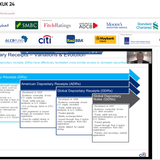Banco de Bogota has announced a 10-year Tier 2 subordinated bond, the proceeds of which will be used to shore up the bank’s capital ratios.
The bank was rumoured to be looking for a US$500mn to US$600mn after gathering about US$1.3bn in orders.
Despite the high demand, pricing on the new debt is expected to come in higher than that secured on its outstanding notes.
The bank’s existing subordinated debt, maturing in 2023, is currently yielding 5.5%. The guidance for the new issue came in 100bp wide of this at 6.5% plus or minus 12.5bp. The lead banks on the transaction put a fair value on the new issuance of 6% to 6.125%.
The depreciation of the Colombian peso over the past year has had a negative impact on the bank’s financial position.
Sergio Pena, Associate Director of Financial Institutions at Fitch Ratings Colombia, said that the significant depreciation of the Colombian peso had caused Banco de Bogota’s capital ratios to decline in 2015 given its sizeable assets abroad.
“Fitch estimates the depreciation impact on Bogota's FCC ratio (Fitch Core Capital ratio is used to assess a bank’s capitalisation) was between 100bp and 150bp,” he added.
Pena did note however that the ultimate effect of this was partially offset by the higher contributions of foreign, US dollar-denominated revenues.
The Bank will continue to use the old Tier 2 structure, which slowly loses its regulatory credit as newer Basel III-compliant instruments are phased in. This is cheaper than issuing new Tier 2 securities, which include loss absorption provisions and are priced at a premium.
Moody’s believes that this does not address the bank’s weak capitalisation. Fitch however does not see the fact that the bank will use the older Tier 2 structure as an issue. Pena instead said that the FCC explained Fitch’s Rating Watch Negative (RWN), which will be reflected in the bond’s rating.
Despite a weaker peso affecting Banco de Bogota’s FCC ratio, it has not impacted the bank’s offshore operations.
“Offshore operations, that represent around 40% of total assets, actually play a countercyclical role for Banco de Bogota, as although they expose the bank to dollar assets, they also increase dollar revenue contributions,” he said.
Foreign operations also provide benefits in terms of diversification, as Central American economies are less connected to Colombia and are closely tied to the US.
“On the liability side of the balance sheet, foreign funding is modest and debt service commitments in the short term are relatively small, on average representing less than 10% of total funding. Maturities are generally well laddered, ranging from 2 to 20 years. Additionally, debt servicing requirements of non-COP denominated currencies is helped by the banks’ foreign currency generating assets,” Pena noted.









